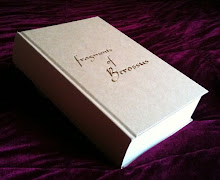I strove to bear in mind Samuel Taylor Coleridge's distinction between prose and poetry:
Prose; the right words in the right order. Poetry; the best words in the best order.to ensure that though the form might be prosaic the content was purely poetic.
The text is superficially straightforward, but the words have been chosen with great care to communicate not only simple, direct meanings but also to convey additional, subtler suggestions. In conjunction with sometimes ambiguous punctuation, they often say several things at once: certain phrases, sentences and even longer passages can be read many ways — which ways the reader chooses, consciously or unconsciously, to interpret any particular text is — deliberately — beyond my control.
Careful wording has also allowed me to include more than a few puns (not all in English) and the occasional joke.
Fragments of Berossus has been written to be read aloud — as well as merely "read." Indeed, when read aloud hitherto unnoticed meanings may surface.
+adjusted+for+blog.jpg)
No comments:
Post a Comment